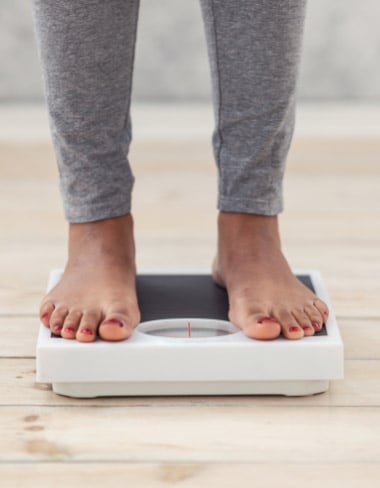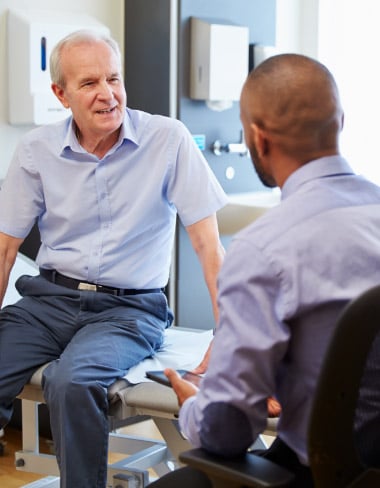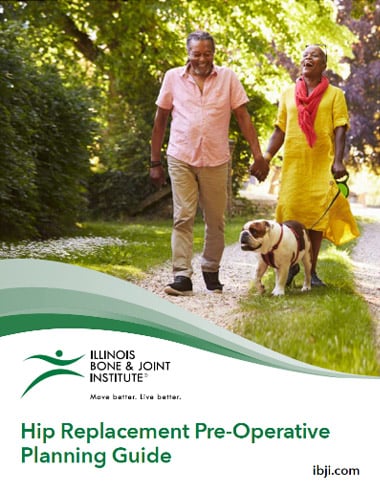The Ultimate Guide to Hip Pain Relief
Learn what causes different types of hip pain and discover which treatment option is best to help you get back to normal.
This guide to hip pain relief covers:
Without a fully functional hip joint, it’s harder to stand, walk, run, or dance.
When hip pain causes day-to-day activities to become troublesome, and at-home care such as rest, pain relievers, applying ice or heat does not work, it’s time to see a specialist.
You don’t have to live with persistent hip pain.
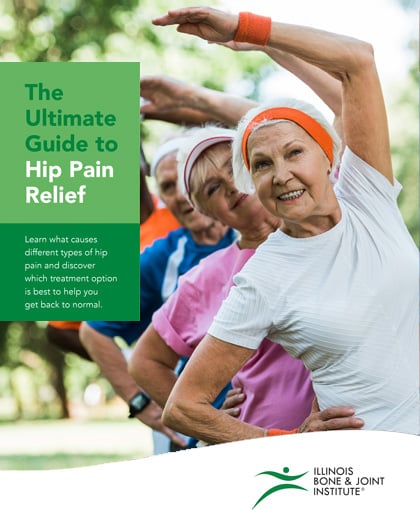
Download your copy of the Ultimate Guide to Hip Pain Relief

Symptoms of Hip Pain
Symptoms can range depending on the condition that’s causing your hip pain. You might feel the discomfort in one or multiple areas:
- Groin
- Thigh
- Inside of your hip joint
- Outside of your hip joint
- Lower back
- Buttocks
Sometimes pain from areas of the body, such as the groin or lower back, can radiate from the hip joint. You might notice that your pain gets worse with activity, especially if it’s caused by arthritis. Along with the pain, you might have a reduced flexibility of your hip. Some patients develop a limp from persistent hip pain.
If you have minor hip pain, try at-home remedies such as resting, taking pain relievers, or applying ice or heat to the area.
Dr. Alexander J. Tauchen discusses hip pain on Living Healthy Chicago

Causes of Hip Pain
Learn about the diagnosis, causes, and treatment options available to bring relief from both acute and chronic hip pain.
Hip pain may be caused by arthritis, injuries, strains, pinched nerves, or other problems. Here are some of the most common causes of hip pain:
Arthritis of the Hip
Arthritis is one of the most frequent causes of hip pain. According to the Centers for Disease Control, arthritis affects around 27 million people every day.
Signs You Might Have Hip Arthritis
Due to age, trauma, or other factors, the cartilage in the hip that cushions your joints starts to break down, causing the bones to rub together during movement. The bone-on-bone action often creates pain, stiffness, and loss of movement. If non-surgical treatments fail, hip replacement surgery is an option for treating hip arthritis.
Learn More about the Symptoms of Osteoarthritis
Trochanteric Bursitis (Hip Bursitis)
Trochanteric bursitis causes inflammation of the bursa over the outside of the hip joint. The bursa is a fluid-filled sac that reduces friction and cushions the points between the bones, tendons, and muscles.
Bursae are located throughout the body, including the hips. The condition known as bursitis is an inflammation of the bursa that can cause irritation of the soft tissues that surround the muscles and bones of the hip. Rest, ice, and pain medications can help treat the condition.
Learn More on How to Tell If Hip Pain Is from Arthritis or Bursitis
Tendonitis of the Hip
A tendon is a fibrous structure used to join a muscle to a bone, and hip tendonitis is a condition that affects the tendons that surround your hip joint.
When a tendon in the hip becomes inflamed, irritated, or swollen, it can cause immense pain. The most frequently encountered tendonitis around the hip is iliotibial band (IT band) tendonitis.
Tendinitis can be caused either by injury or overuse of the tendons. It also happens with age as tendons lose elasticity.
Osteonecrosis of the Hip
Osteonecrosis is a condition that occurs when an inadequate amount of blood flow reaches the bone, the cells die, and the bone may collapse. One of the most common places for osteonecrosis to occur is in the hip joint.
Snapping Hip Syndrome
Snapping hip syndrome is a phrase used to describe three different hip problems. The first is when the IT band snaps over the outside of the thigh. The second occurs when the deep hip flexor tendon snaps over the front of the hip joint. Finally, tears of the cartilage, or labrum, around the hip socket can cause a snapping sensation.
Hip Impingement
The hip is a ball-and-socket joint. In a normally functioning hip, the ball rotates freely within the socket. In certain situations that can be caused by trauma, repetitive stress, developmental abnormalities, or other (sometimes unknown) reasons, the ball may bind or begin to seize up within the socket. This can cause painful wearing of the joint cartilage or possibly a tear of the labrum.
Hip Labral Tear
The labrum is a cartilage ring that surrounds the edge of the hip joint. The purpose of the labrum is to firmly hold the thigh bone ball in the hip’s socket. Trauma, repetitive motions, and hereditary conditions can all cause painful tears in the labrum.
Hip labral tears are increasingly being recognized as a cause of pain and catching sensations in the joint. Often hip arthroscopy is a treatment option, if non-surgical treatment does not work.
Stress Fractures of the Hip
Stress fractures of the hip are most common in athletes who participate in repetitive high-impact sports or activities such as long-distance running. They can also occur spontaneously in persons with osteoporosis.
Hip Muscle Strains
Strains of the muscles around the hip and pelvis can cause pain and spasm. The most common types of hip muscle strains are groin pulls and hamstring strains.
Hip Fracture
Hip fractures are most common in elderly patients with osteoporosis. Treatment of broken hips requires surgery to either replace the broken portion or repair it with a metal plate and screws. The type of surgery needed is determined based on the exact location of the fracture.
Listen to IBJI OrthoInform Podcast: Hip Fractures with Dr. Evan Dougherty
Hip Dislocation
A blunt force trauma such as an automobile accident, sports injury, or fall can cause the hip joint to become dislocated, where the ends of the bones are forced from their normal position.
Hip dislocation is an excruciating injury that can immobilize your hip joint, making walking nearly impossible.
Carrying Extra Weight
Being overweight can burden your hip joints, causing you to experience pain or inflammation. Extra weight increases pressure, which causes increased hip joint wear and tear.
Damage to the cartilage results in arthritic changes on the joint and can cause you to experience decreased range of motion, stiffness, pain, swelling, or warmth. Inflammation from weight gain may also cause conditions such as osteoarthritis.
Losing weight is often more manageable when you have an experienced, trusted partner to help you. For the greatest chance at success, find someone to work with who offers a collaborative approach for improving your health and wellness.
IBJI’s OrthoHealth program, led by certified weight management doctors, is specially designed to help you manage all of the different factors impacting your weight and put you on track to optimize your health, even when your ability to exercise is limited by joint pain.

When You Should See a Doctor for Hip Pain
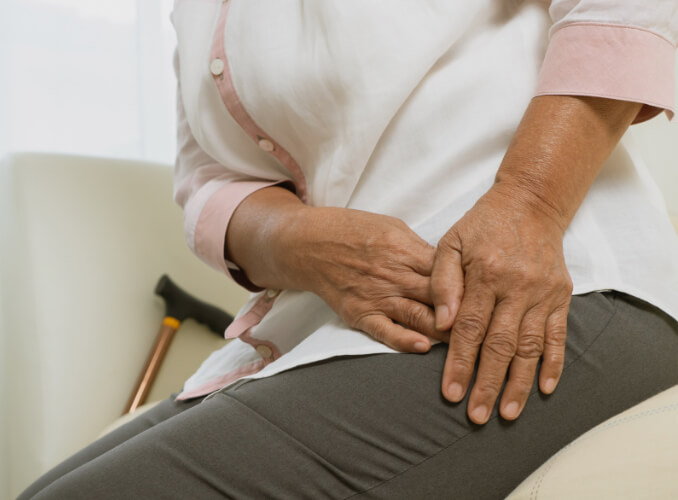
When your hip pain does not resolve with home care such as rest, pain relievers, ice, or heat, it’s time to see a hip doctor.
Getting the right care from the right physician who specializes in treating hip pain can help get you back to doing what you love—walking the dog, going on a hike, running around with your grandkids, and doing all of the other enjoyable activities that make up daily life.
4 Tips for Finding a Great Hip Surgeon
Always consult a hip specialist for personalized treatment options and medical advice, especially if you experience any of the following symptoms:
- You have sudden hip pain
- You have intense hip pain
- You have hip pain triggered by a fall or other injury
- Your hip appears deformed
- Your hip is bleeding
- Your hip is making a popping noise after an injury
- You feel hip pain at night or when you are resting
- You notice swelling, redness, or warmth around your hip joint
- You have hip pain and swelling that doesn’t start feeling better after resting
- You can’t put any weight on your hip
- You can’t move your leg or hip
How to Determine If It’s Time to Seek Treatment for Hip Pain

How Hip Conditions Are Diagnosed
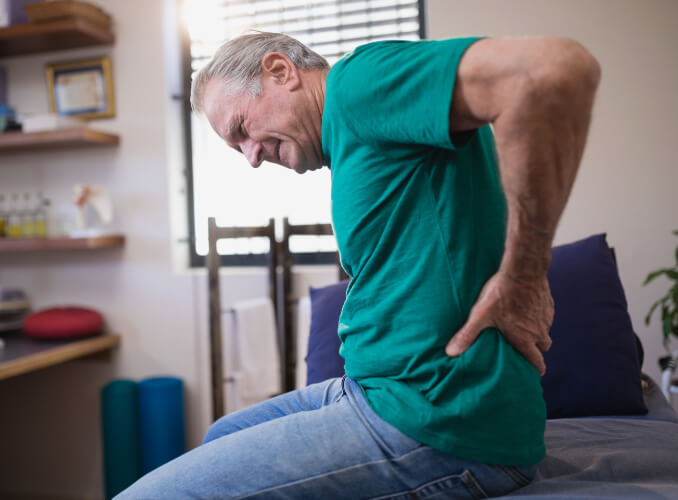
Making the proper diagnosis is essential to finding the right care. When you make an appointment with a hip doctor, they will do a complete assessment to pinpoint the precise cause of your hip pain.
Your hip doctor will start by performing a physical exam and asking you questions about your symptoms. They will ask where in your hip you have experienced pain, what that pain feels like, and when that pain occurs.
During this exam, your hip doctor will also evaluate how you walk. They may press on your hip or ask you to move your hip and leg in specific ways. Other things that the doctor will check include:
- How your hips rotate
- If you have leg length discrepancies
- The state of your hip muscle strength
- How much range of motion you have (as well as if there is tightness)
Your doctor may be able to diagnose your hip pain without the use of X-rays, MRI, or CT scans. However, they can be crucial tools for making a diagnosis if your personal history and physical exam are inconclusive.
X-rays provide a look into the condition of your hip bones and joints and are typically the first type of imaging study to be ordered. From an X-ray, your hip doctor will be able to see if there is a loss of joint space or the growth of bone spurs, two features which would suggest the presence of arthritis.
An MRI can show details about soft tissues like cartilage, the labrum, tendons, muscles, or the bursa in your hip. In certain situations your doctor may order the MRI to be done with an arthrogram, which consists of injecting liquid contrast dye into the hip joint in order to outline some of the soft tissues in more detail.
A CT scan will obtain a more detailed cross-sectional image of the body, providing more insight. Your hip doctor may order one, two, or all three of these imaging tests, depending on the results of other exams.
The doctor may also ask to take a sample of fluid from the hip joint that is causing you pain. This joint fluid sample will be tested to see if there are any infections and will provide other diagnostic clues to what may be causing the problem. Removal of this fluid may also alleviate some of the pain.
Once a hip specialist better understands the cause of your hip pain, they will share a diagnosis with you so you can start exploring appropriate treatment options.

Hip Pain Treatments & Remedies

If you are experiencing minor hip pain, you can first try some home remedies to relieve the pain. If you have mild to moderate hip pain, you can try some of these at-home remedies:
Rest
Avoid activities and movements that require you to bend deeply at the hip or jarring activities that can put a lot of pressure on the hip, such as running. If sleeping on the side of your affected hip is painful, it should be avoided.
Over-the-Counter Pain Relievers
Some over-the-counter pain-relieving medications like acetaminophen, ibuprofen, and naproxen sodium can help reduce inflammation that may be causing or aggravating your hip pain.
Cold and Heat
Using cold or hot compresses may help the pain. When using an ice treatment, wrap the ice pack in a towel before placing it on your hip. Ice can help to control swelling and inflammation. A warm bath or heating pad may also help reduce your pain. The heat will also help to prepare your muscles for stretching.
Stretching
Hip pain may be reduced with gentle stretching, especially if the cause of your pain is from a strain or pinched nerve.
Learn More on Managing Hip Pain without Surgery
Weight Management
As previously stated, obesity and extra weight can put extra pressure on your joints, causing pain. Losing even a small amount of weight can significantly decrease the overall force and pressure on your joints. Similarly, small changes in your overall diet and lifestyle can reduce pain and inflammation in your body.
OrthoHealth Medical Wellness
If you need help with losing weight or optimizing your health, IBJI’s OrthoHealth team of weight management doctors, physical therapists, registered dietitians, and health coaches can help put you on a healthy path.
Our OrthoHealth physicians understand that a patient's joint pain can significantly affect their ability to exercise. For this reason, OrthoHealth is designed to assess each patient’s lifestyle to find realistic and sustainable changes — including optimizing nutrition, reducing stress, promoting pain-free movement, and improving sleep habits — that make a big impact on overall health and performance.

Meet IBJI's Hip Care Patients

Left Hip Replacement
Right Hip Replacement
"I followed what they said and at 12 days post-op, I was walking without aid. It was amazing that I could walk without pain."
- Nate B., Age 64 Total Hip Replacement
- Anthony, Age 49 Return to Ice Skating after Hip Surgery
- Jean B., Age 64 Anterior Approach Hip Replacement
- Lila P., Age 64 Surgery to Repair a Broken Hip
- Ted H., Age 64 Anterior Hip Replacement Surgery
- Sharon T., Age 64 Weight Loss for Hip Replacement
- Eileen Journey to Hip Recovery
- James, Age 70 Hip and Knee Replacements

FAQs about Hip Surgery
If home remedies and non-surgical treatment fail to relieve your hip pain, your doctor may recommend surgery as a way to feel better and improve your mobility.
Learn how IBJI provides specialized care and rapid recovery solutions for joint replacement surgeries. Featuring expert insights from Dr. Ritesh Shah and testimonials from professional athletes, discover how modern surgical techniques can get you back to the activities you love—sooner and safer.
No, hip pain is not always treated with a total hip replacement. Your hip pain may be a result of a fall, sports injury, or chronic condition. Based on your diagnosis, your physician will treat you accordingly. Hip pain can be treated non-surgically or with minimally invasive surgery.
Non-surgical options include physical therapy, acupuncture, manual massage, medication and injections.
Minimally invasive surgery can include hip arthroscopy, hip resurfacing, surgical dislocation and osteotomy.
Listen to IBJI OrthoInform Podcast: Total Hip Replacement with Dr. Michael O'Rourke
There are multiple treatments and surgeries that may be discussed for your pain. A total hip replacement may only be recommended if your mobility is worsening and no other treatment has helped.
Learn More about What Makes You a Good Candidate for Hip Replacement
Hip resurfacing is a conservative artificial joint replacement, where the hip joint is trimmed instead of being completely replaced as in a total hip replacement procedure.
The goal of hip resurfacing is to provide a more active and improved quality of life. This is done by restoring functionality to the hip by replacing damaged bone and cartilage in the socket while preserving as much natural bone as possible. The femoral head is not removed in hip resurfacing but is instead trimmed and resurfaced with a smooth metal dome. While hip resurfacing represents a possible alternative to traditional hip replacement, there are certain risks to the procedure that your doctor should discuss with you. Additionally, only certain persons with certain conditions are candidates for hip resurfacing.
Learn More about the Difference between Hip Resurfacing and Hip Replacement
Hip arthroscopy is a minimally invasive outpatient surgical procedure performed by inserting a small camera into the joint and using specialized instruments to treat labrum or other cartilage tears, hip impingement, tendon tears, and/or bursitis.
Learn More from Our Q&A on Hip Arthroscopy
Listen to IBJI OrthoInform Podcast: Hip Arthroscopy with Dr. Ritesh Shah
Total hip replacement surgery is a commonly performed surgical procedure used to treat hip arthritis when movement is restricted and non-surgical alternatives prove unsuccessful for improving mobility and reducing pain.
Learn about the Benefits of Anterior Total Hip Replacement
Empowering Mobility with Robotic Hip and Knee Replacement
The types of arthritis treated by a total hip replacement include arthritis caused by wear and tear (osteoarthritis), traumatically-induced arthritis, and inflammatory arthritis (rheumatoid arthritis).
Current techniques involve replacing the ball and then placing a cup into the socket of the hip. There are different joint surface materials available to choose from, with new choices being developed and updates to the existing materials occurring all the time.
Inpatient joint replacement means that the patient will be admitted to the hospital to stay overnight or longer for recovery, although some individuals may only need a brief stay. Physicians keep these patients at the hospital to monitor them more closely.
Outpatient joint replacement does not require hospitalization. Outpatient joint replacement, also known as same-day surgery, is an alternative route that patients can take to avoid an overnight stay at the hospital post-surgery. This option allows the patient to receive joint replacement surgery in an ambulatory surgical center while being given clearance to return home in under 24 hours.
This alternative approach to joint replacement surgery rewards the patient with many benefits previously unavailable with inpatient treatment. Not only can patients return home immediately following surgery, but there is also a potentially lower risk of postoperative infection.
Outpatient surgery lowers the pricey out-of-pocket expenses one might see from extended stays in a hospital and through the recovery process. While outpatient hip replacement surgery is very safe and successful, it is not recommended for everyone. If you are considering hip replacement surgery, talk to your doctor to determine whether you are a candidate to have outpatient surgery.
Discover Other Benefits of Outpatient Joint Replacement
Read Eileen's Story: From Pain to Pilgrimage - Journey to Hip Recovery at IBJI
You will be able to resume light household and community activities within four to six weeks. Full recovery to resume all activities usually occurs in about two to three months. Complete recovery usually takes six to twelve months following your surgery, so have patience and continue your exercises and rehab activities.
Learn More about the Risks and Potential Complications of Hip Surgery
Once you heal and recover from your surgery, you are free to enjoy low-impact activities, including walking, hiking, swimming, cycling, using a treadmill or elliptical, playing golf, playing light tennis, and skiing. Higher impact activities such as basketball, volleyball, and long-distance running are not advised. If you have any questions about specific activities, call your doctor’s office.
Get the Facts about Having Better Sex after Hip Replacement Surgery
Dr. Goldstein, a leading hip replacement specialist, discusses the latest advancements in hip surgery that allow patients to walk within hours and return home the same day. Find a Doctor Near You
Learn more about Illinois Bone & Joint Institute's Hip Specialists
Living a normal life again is possible. You don’t have to settle for living with hip pain.
Many conditions may cause hip pain, and some are more serious than others. That’s why it’s essential to not rely on a self-diagnosis alone. Instead, seek treatment from a doctor–especially if your chronic hip pain is altering your day-to-day activities.
The highly-skilled doctors at Illinois Bone & Joint Institute will diagnose and treat your pain. They will assess your pain with a series of tests to ensure that you receive the correct diagnosis. From there, they will discuss the best treatment options, and together you will make an informed decision on what care best suits your needs.
Our doctors are eager to answer your questions and see you through every step of your treatment and recovery process. We will exhaust all options to get you back to pain-free activity.
Cutting-edge Treatments & Services
As the premier orthopedic institute in the Midwest, IBJI is the best choice for hip treatment and surgery. Our experienced, compassionate physicians are among the most highly-trained orthopedic physicians in the region.
The hip specialists at Illinois Bone & Joint Institute will help you move better, so you can live better. If you or someone you love is suffering from hip pain, contact IBJI today.
Find a hip specialist, schedule online today, and get on the path to recovery.
IBJI's Hip Pain Relief Resources
Begin your journey to hip pain relief with this essential list of resources detailing causes and treatment options. This comprehensive collection of resources, curated by our experienced team of specialists, physical therapists, and surgeons, has empowered thousands across Chicagoland to regain mobility.Downloadable Guides
Podcast Episodes
Videos
- Anatomy of the Hip Joint
- Anterior vs. Traditional Total Hip Replacement
- Bursitis of the Hip (Trochanteric Bursitis)
- Hip Fracture: Causes and Symptoms
- Hip Pain with Dr. Alexander J. Tauchen
- Hip Surgery Recovery: How Long Does It Take to Recover?
- How to Get Rid of Hip Impingement Syndrome Pain
- How to Treat Arthritis and Other Ailments of the Hip and Knee
- Labral Tear of the Hip (Acetabular Labrum Tear)
- Osteoarthritis Hip Pain: Symptoms and Treatment
- Osteoporosis and Hip Fracture Risk for Elderly
- Perthes Disease
- Staying "HIP"
- What is Hip Arthroscopy?
- What is a Hip Labrum Tear?
Blog Articles
- 4 Tips for Finding the Best Hip Replacement Surgeon
- Advantages of Anterior Total Hip Replacement
- Am I a Good Candidate for Hip Replacement Surgery?
- Common Causes of Hip Pain and When to Seek Treatment
- Differences between Hip Resurfacing and Hip Replacement
- Don’t Fret Your Child’s Perthes Disease Diagnosis
- Elderly at Risk for Hip Fractures
- Mobility with Robotic Hip and Knee Replacement
- Hip Fracture Symptoms and Recovery
- Hip Impingement Syndrome
- Hip Surgery Risks and Complications
- How to Manage Hip Pain without Surgery
- How to Tell if Your Hip Pain Is from Arthritis or Bursitis
- Injections for Treating Hip Pain
- Osteoarthritis Hip Pain: Symptoms and Treatment
- Osteonecrosis of the Hip
- Q&A on Arthroscopic Hip Surgery
- Painful Hips? It Could Be Hip Osteoarthritis
- Pros and Cons: Is Having Hip Replacement Surgery Worth It?
- Sex after Hip Replacement
- Signs You Might Have Hip Arthritis
- Snapping Hips Isn’t the Name of a Rock Band
- Tips for Losing Weight before Hip Replacement
- Tips for Stopping Smoking before Hip Replacement Surgery
- What is Hip Bursitis? Treatment, Causes and Diagnosis

